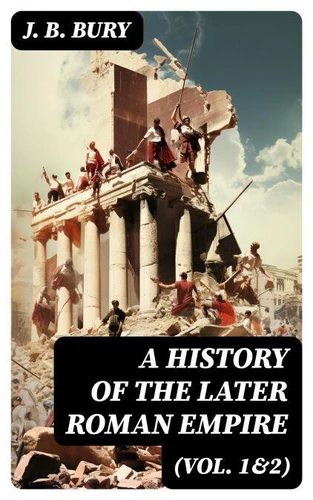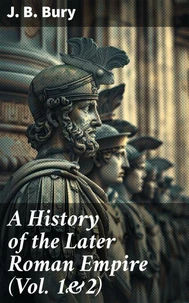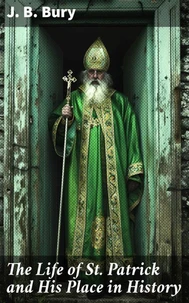A History of the Later Roman Empire (Vol. 1&2). From the Death of Theodosius I to the Death of Justinian - German Conquest of Western Europe & the Age of Justinian
Par :Formats :
Disponible dans votre compte client Decitre ou Furet du Nord dès validation de votre commande. Le format ePub est :
- Compatible avec une lecture sur My Vivlio (smartphone, tablette, ordinateur)
- Compatible avec une lecture sur liseuses Vivlio
- Pour les liseuses autres que Vivlio, vous devez utiliser le logiciel Adobe Digital Edition. Non compatible avec la lecture sur les liseuses Kindle, Remarkable et Sony
 , qui est-ce ?
, qui est-ce ?Notre partenaire de plateforme de lecture numérique où vous retrouverez l'ensemble de vos ebooks gratuitement
Pour en savoir plus sur nos ebooks, consultez notre aide en ligne ici
- Nombre de pages992
- FormatePub
- ISBN859-65--4776645-2
- EAN8596547766452
- Date de parution27/12/2023
- Protection num.Digital Watermarking
- Taille1 Mo
- Infos supplémentairesepub
- ÉditeurDIGICAT
Résumé
In "A History of the Later Roman Empire, " J. B. Bury delivers a meticulously researched and engaging narrative that explores the complexities of the Roman Empire during its transformative years from AD 284 to the fall of Constantinople in 1453. Bury's literary style is marked by a profound analytical approach, seamlessly weaving together political, social, and cultural dimensions of the period. He situates his study within the broader context of early 20th-century historiography, where the interplay of momentous events and figures-such as the reign of Emperor Diocletian and the rise of Byzantine influence-are examined with clarity and depth, offering readers a nuanced understanding of this critical juncture in history.
J. B. Bury was a prominent historian and philologist whose scholarly work reflected a deep-seated interest in the dynamics of power and identity in the ancient world. His academic background and extensive travels across Europe enriched his understanding of the Roman Empire's legacy, allowing him to draw insightful connections between the past and contemporary issues. His engagement with classical literature and history informed his profound views on the evolution of civilization, making his analyses particularly poignant and relevant.
I highly recommend "A History of the Later Roman Empire" to both historians and general readers alike. Bury's work not only serves as an essential reference for scholars but also provides an accessible yet profound exploration for those eager to understand the complexities of the Roman Empire's later phases. This seminal text remains a cornerstone for anyone seeking to grasp the intricate tapestry of history that shaped modern Europe.
J. B. Bury was a prominent historian and philologist whose scholarly work reflected a deep-seated interest in the dynamics of power and identity in the ancient world. His academic background and extensive travels across Europe enriched his understanding of the Roman Empire's legacy, allowing him to draw insightful connections between the past and contemporary issues. His engagement with classical literature and history informed his profound views on the evolution of civilization, making his analyses particularly poignant and relevant.
I highly recommend "A History of the Later Roman Empire" to both historians and general readers alike. Bury's work not only serves as an essential reference for scholars but also provides an accessible yet profound exploration for those eager to understand the complexities of the Roman Empire's later phases. This seminal text remains a cornerstone for anyone seeking to grasp the intricate tapestry of history that shaped modern Europe.
In "A History of the Later Roman Empire, " J. B. Bury delivers a meticulously researched and engaging narrative that explores the complexities of the Roman Empire during its transformative years from AD 284 to the fall of Constantinople in 1453. Bury's literary style is marked by a profound analytical approach, seamlessly weaving together political, social, and cultural dimensions of the period. He situates his study within the broader context of early 20th-century historiography, where the interplay of momentous events and figures-such as the reign of Emperor Diocletian and the rise of Byzantine influence-are examined with clarity and depth, offering readers a nuanced understanding of this critical juncture in history.
J. B. Bury was a prominent historian and philologist whose scholarly work reflected a deep-seated interest in the dynamics of power and identity in the ancient world. His academic background and extensive travels across Europe enriched his understanding of the Roman Empire's legacy, allowing him to draw insightful connections between the past and contemporary issues. His engagement with classical literature and history informed his profound views on the evolution of civilization, making his analyses particularly poignant and relevant.
I highly recommend "A History of the Later Roman Empire" to both historians and general readers alike. Bury's work not only serves as an essential reference for scholars but also provides an accessible yet profound exploration for those eager to understand the complexities of the Roman Empire's later phases. This seminal text remains a cornerstone for anyone seeking to grasp the intricate tapestry of history that shaped modern Europe.
J. B. Bury was a prominent historian and philologist whose scholarly work reflected a deep-seated interest in the dynamics of power and identity in the ancient world. His academic background and extensive travels across Europe enriched his understanding of the Roman Empire's legacy, allowing him to draw insightful connections between the past and contemporary issues. His engagement with classical literature and history informed his profound views on the evolution of civilization, making his analyses particularly poignant and relevant.
I highly recommend "A History of the Later Roman Empire" to both historians and general readers alike. Bury's work not only serves as an essential reference for scholars but also provides an accessible yet profound exploration for those eager to understand the complexities of the Roman Empire's later phases. This seminal text remains a cornerstone for anyone seeking to grasp the intricate tapestry of history that shaped modern Europe.







